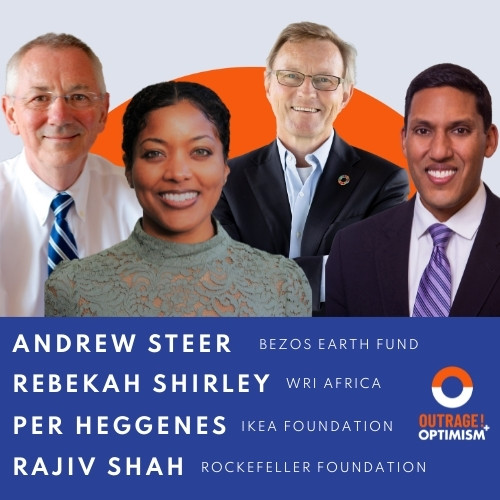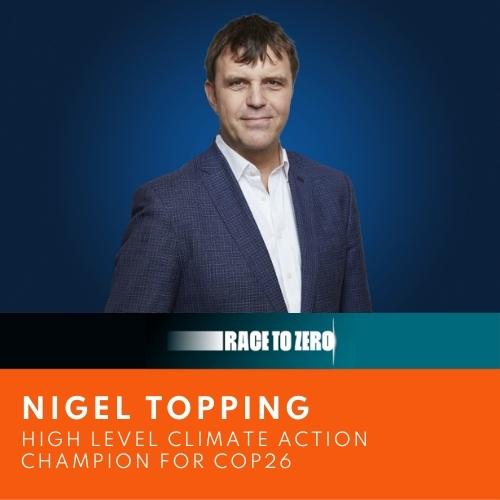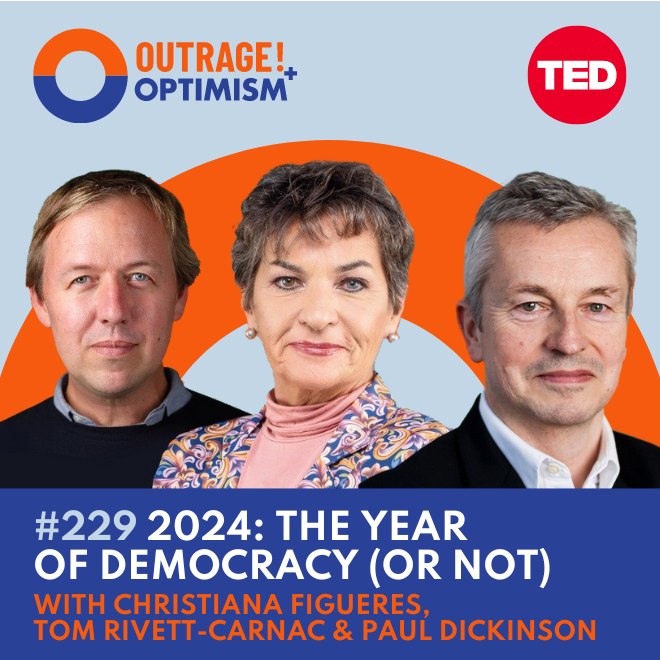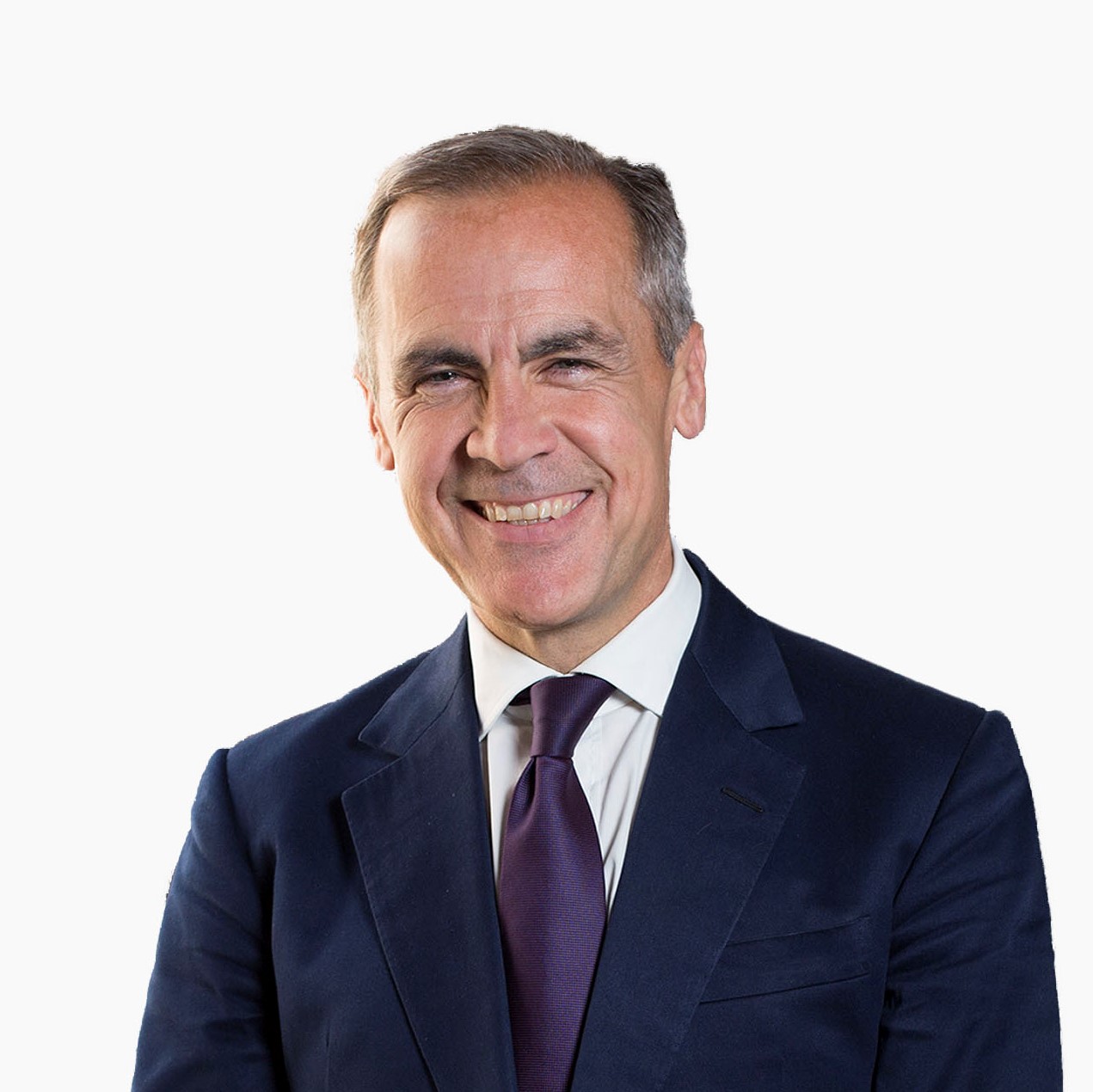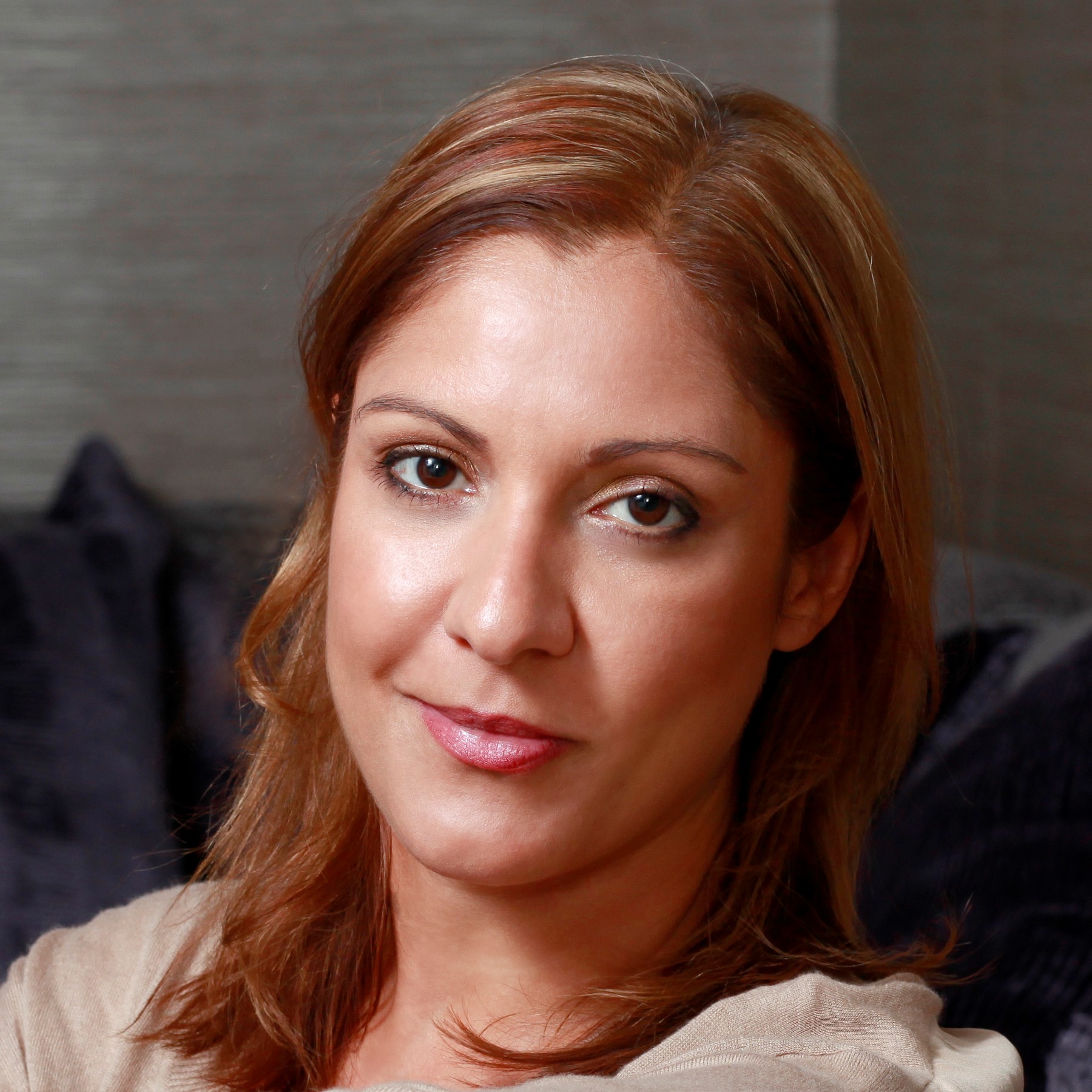100: Financing The Race to Zero!
Welcome to the third episode of our Race To Zero series!
About this episode
Welcome to the third episode of our Race To Zero series!
In this episode, we show you the money. Finance is an absolutely crucial factor in accelerating our world towards a Net-Zero future, and with less than 9 years left to halve our global emissions and current investments and markets spiraling towards catastrophic risk, it’s going to take every financial lever we have to shift the global economy to a sustainable, equitable, and just system.
Watch
Full Transcript
Transcript generated by AI. While we aim for accuracy, errors may still occur. Please refer to the episode’s audio for the definitive version
Tom Rivett-Carnac: [00:00:24] Hello and welcome to Outrage + Optimism, I'm Tom Rivett-Carnac.
Christiana Figueres: [00:00:28] I'm Christiana Figueres.
Paul Dickinson: [00:00:29] And I'm Paul Dickinson.
Tom Rivett-Carnac: [00:00:30] We are back with another episode in our Race to Zero series. Today, we are going to be delving in to the all important, crucial issue of finance. Thanks for being here. So, listeners, we have a cracking episode for you today. This is going to be a really remarkable hour in which we're going to delve into one of the most important and consequential issues on climate change, and that is finance. Now, don't panic, data suggests that finance is an issue that many people find incredibly intimidating and that they don't understand the language. There's a whole bunch of terminology,
Christiana Figueres: [00:01:17] And boring!
Tom Rivett-Carnac: [00:01:18] Boring.
Paul Dickinson: [00:01:19] So I'm not rich enough, so I haven't got any money anyway.
Tom Rivett-Carnac: [00:01:23] A complicated, impenetrable, boring issue.
Christiana Figueres: [00:01:27] However.
Tom Rivett-Carnac: [00:01:27] However, it could not be more important. This is where the rubber meets the road. This is where we're going to decide or it is going to be decided whether or not we deal with this issue in time or not. And actually, what we've got for you today is a series of amazing conversations that are straightforward, that will help you understand what's going on and it will demonstrate how we can move through these difficult issues to actually achieve the turning points that we need. It's all very exciting.
Paul Dickinson: [00:01:52] Well, I couldn't agree with you more. And I'm going to quote three fantastic quotations, too, from people.
Tom Rivett-Carnac: [00:01:58] You're giving us three quotations?
Paul Dickinson: [00:02:01] Well, they're quite short. Whatever. Settle down. This is the first one is from the late, great Tessa Tenent, who was the inspiration to many people. And she created the first kind of environmental investment fund in Europe in 1988. And she said that finance was like a bird's eye view over the whole economy. But from finance, you could see everything else, which I thought was an incredibly astute perspective. And then in 2003, Madeleine Albright, the former U.S. secretary of state, was at a finance event and she said, our business is to help investors vote with their money. And that went very deeply with me. She's an academic and a politician, and she was speaking with a whole bunch of investment institutions, and that's what she said. And then the third quote, I think I must have dreamt, because I've looked up on the Internet 100 times and I've never found it attributed to anybody.
Tom Rivett-Carnac: [00:02:52] That means you can claim it as a Paul Dickinson original.
Paul Dickinson: [00:02:55] Money is information about the future. OK.
Tom Rivett-Carnac: [00:02:59] Now, despite the slightly esoteric nature of those quotes, this is going to be an understandable episode. Listeners, I assure you, Christiana.
Christiana Figueres: [00:03:06] I actually like the third quote more than the other two, and I think we should ascribe it to Paul. Well, there you go.
Paul Dickinson: [00:03:12] I'll take it.
Christiana Figueres: [00:03:15] You can put it out as a tweet.
Tom Rivett-Carnac: [00:03:17] His third tweet.
Paul Dickinson: [00:03:18] There's a lot of pressure building on me to do the third tweet, but I still think the first two are so perfect. Why take a risk?
Christiana Figueres: [00:03:26] Well, however, it is actually a fun episode. So we promise to edutain you on climate finance, you will be both informed and entertained by quite a few aspects of climate finance and you will be brought up to date on where we are on this all important issue.
Paul Dickinson: [00:03:48] There you go from movers and shakers from the world, big names. Is that right Tom?
Tom Rivett-Carnac: [00:03:52] Absolutely. So in the course of the next 45 minutes or so, you're going to hear from Mark Carney, the UN special envoy for Climate Action and Finance. Amal-Lee Amin the climate change director at CDC, the UK's development finance institution, Tom DiNapoli, the comptroller of the enormous New York State Pension Fund, the fourth largest pension fund in the U.S. Kristalina Georgieva, the managing director of the International Monetary Fund, and Carlos Manuel Rodriguez, the CEO and chair of the Global Environment Facility. If you listen carefully, you may even also notice Nigel Topping dropping in, as he so regularly does on this podcast. Enjoy.
Load MorePaul Dickinson: [00:04:28] This is huge. I mean, honestly, there are so many important people in this podcast, they can't all travel in the same car or something. I mean, if this podcast was hit by a meteorite or something, that would probably be the end of green finance. I'm just saying.
Tom Rivett-Carnac: [00:04:39] And and our guide for the next hour will be none other than Christiana herself.
Paul Dickinson: [00:04:44] And we'll be back afterwards with some summary of what we thought.
Tom Rivett-Carnac: [00:04:48] So here we go. Christiana, take us away.
Mark Carney: [00:05:08] Do you hear me? How are you? Are you still in Costa Rica?
Christiana Figueres: [00:05:18] Yes, I'm planning on staying here. I will only move from my house if there's an intergalactic emergency. Otherwise I'm not moving.
Mark Carney: [00:05:26] Fantastic. Fantastic.
Christiana Figueres: [00:05:28] Ok, I know that 2019 feels like a very long time ago now, but regular listeners of this podcast might remember our interview with Mark Carney all the way back in November of that year when he was still Governor of the Bank of England.
Mark Carney: [00:05:47] Last time we did this in the Bank of England, could you imagine that?
Christiana Figueres: [00:05:52] I know. Now, Mark Carney is the UN special envoy on climate action and finance. First time we've ever had a U.N. special envoy for climate finance. And Mark is also advising the UK government on mobilising finance for COP 26. We asked Mark how he is going to leverage the ambitious New Glasgow Finance Alliance for Net Zero (GFANZ as an acronym) to set the finance system toward accelerated climate action. For the discussion with Mark, we were delighted to be joined by our good friend Nigel Topping the UK's high level climate action champion.
Mark Carney: [00:06:37] But to get to the heart of it, in terms of what I'm doing, just say two sentences on that. The first is working with others on the plumbing of the financial system so that every financial decision takes climate change into account and so that information, its tools like stress testing and its new markets. So those three but what we're talking about now is having the commitments and not just the commitments, the actions to finance the path to net zero and accelerate that pathway. This is an alliance of alliances. And when Nigel Topping and myself and others were, we're thinking about the architecture for the financial system as it was evolving, as some alliances were setting up. And I think in many respects we look first to the Net Zero Asset Owners Alliance. So those are the pension funds and the big life companies and the people who ultimately have our money. That's all our money in the end. But they're the ones who have the longest horizon, that being the first moving into asset managers. But realising, well, we don't really have an alliance of the standard of Race to Zero for the banks or for the insurance underwriters as well. So that's another alliance coming into being as part of GFANZ. But secondly, getting these pillars in place absolutely necessary and again, reinforce the standard of race to zero, which is critical, the gold standard for a net zero commitment. It's the financial sector. So we need to have it coordinated between these various types of entities. We need a table where they can coordinate and be reinforcing more than the sum of their parts and they can identify which elements of that plumbing I spoke about a moment ago is working well. What else is needed, what should be changed and work on that in real time.
Christiana Figueres: [00:08:36] And as you look across the table at public finance, from where I sit, I see private finance as being able to provide the scale and the speed that is necessary, assuming that public finance plays its role. And that role is, I think, at least a two part role. One is de-risking and accelerating private investment, but the other, which is going to play a huge role in COP 26 is the political symbolism of public finance. And these, you know, these hundred billion that have been plaguing us for such a long time. I'd love to know, you know, if you're dealing there in the trillions, which we have to, because that's what we need, a trillion dollars a year for transformation. If you're dealing in the trillions from the private side, how do you look across the table at public finance, both in terms of delivering the political promise? That is basically the tail that wags the dog because what are we going to do? A hundred billion is not going to do anything, but it is the political symbol. And also, how do you see it or what would you like to see in terms of what governments can do with public finance in order to accelerate and de-risk the private side?
Mark Carney: [00:10:00] Yeah, the essential question I love the way you frame it. First, there is a symbolism in a solidarity that comes with, first and foremost, making the one hundred billion, part of which related to multilateral development aid and other elements there, but first and foremost, making that and that is a top priority of this COP, as you know, and needs to be met. Secondly, it is good news that the private sector is moving. It makes it more and more anomalous, more of an outlier, that not all of the multilateral development banks, not all of the development finance institutions are meeting their obligations under the Paris accord under two point one three C to be Paris aligned. The financial sector needs to be Paris aligned. And of course, these institutions themselves at the heart need to be Paris aligned. And we need it now. And in part of your preamble underscores the billions to trillions opportunity that comes with our multilateral development banks and investment finance being Paris aligned and taking on elements of risk in investments, in adaptation and mitigation in developing countries that unlocks much larger components of private finance alongside the so-called blended finance.
Mark Carney: [00:11:27] Now blended finance is sometimes talked about. It's almost like a Holy Grail. It's not a Holy Grail. We can find blended finance. We can unlock blended finance in a way. And I think to the credit of the Italian presidency of the G20 and of course, Italy in the UK are working very closely together, as you know, for COP is to take this issue on and put it on the table and and really focus attention on how our multilateral development banks, for example, using their balance sheets in a way that, of course does absorb risk. You have to absorb risk, but not risk the crowds out the private sector, but that opens up the private sector. And then secondly, as we know, and this is a big emphasis of this call, rightly so, is we need a balance to those flows, a balance between adaptation and mitigation and resilience and really the 50 50 split. And that's look, I'll be candid. I don't think we'll get a 50-50 split from the private sector flows on their own, but we can get a 50-50 split if we have the public flows and the blended flows aligned accordingly.
Mark Carney: [00:12:42] We have to be very explicit and very deliberate about that. And I think it is now time to really do more than one thing at a time, of course. But to spend more attention on that, on the public side.
Nigel Topping: [00:12:55] About the need to be explicit, there's been some mixed reactions to the flurry of bold net zero commitments and in particular, GFANZ, as you said. One hundred and sixty firms, 70 trillion. Can you say something about how people should navigate what is real net zero and what is greenwashing net zero? And how does GFANZ make sure that it's the real deal?
Mark Carney: [00:13:20] Well, I think we're trying to make this simpler. And for the financial sector, which is the bit I and colleagues focus on, is it a real net zero commitment if it's ultimately part of the race to zero. So if it's part of a coalition that is part of a race to zero. And for those who don't follow this as closely and I can understand why some don't.
Nigel Topping: [00:13:44] You mean that not everybody is obsessively following the race to zero?
Mark Carney: [00:13:47] Not everybody knows about race to zero.
Christiana Figueres: [00:13:50] I have no idea. I have trouble just imagining that scenario. I know I'm going to go outside and ask my gardener, are you following the race to zero discussion?
Paul Dickinson: [00:14:03] By the way, everybody who listens to this podcast does know what Race to Zero is. We have me shouting race to zero with an echo and a round of applause. And it comes on every episode.
Mark Carney: [00:14:12] Wow. Right.
Christiana Figueres: [00:14:13] Carry on. Sorry about that.
Mark Carney: [00:14:15] For the purposes of that rare individual, just for the avoidance of what this means and let me use the example of what a real net zero commitment looks like. And I'll start with the Net Zero Banking Alliance, which was set up last week as part of the Glasgow Financial. OK, if you're a bank that are part of that alliance and there's forty three banks from five continents and twenty eight trillion dollars of balance sheet, that is that are part of that, including some of the largest banks in the world, to their credit, founding members, if you were banks part of that within of course you have committed to be net zero on all of your finance. So all the people you lend to, not just your operations, but, of course, what's really relevant with the big footprint, the people you lend to and their portfolio. Yeah, scope one scope two and scope three emissions for that portfolio. Of course, that's net zero by 2050. OK, fine. But like countries, we are all very focused on this decisive decade. So where are you going to be by 2030? And if you're in a race to zero, you have to be contributing your fair share of the 50 percent reduction that we need to get the collective we need to get by 2030. So as a bank, you're also made that commitment.
Mark Carney: [00:15:32] On top of that, you need to have a five year decarbonisation plan for your assets. So that's not 2030. That's five years from now. On top of that, you need to within 18 months, release plans, develop and release plans for your major exposures. So you go across your portfolio. And here's my real estate exposure. This is what's going to happen. This is my plan for decarbonisation. For that, here's my exposure to the auto industry, for the energy industry, for the et cetera, et cetera, and all the way across. And now it's all out in the open. And we're going to go out to all those other institutions that are not in yet. And I'm not criticizing them for not being in. They haven't necessarily had the chance. But by the time we get to Glasgow, they will have had their chance to make a decision whether or not they return to the gold standard for net zero. And part of the solution or not.
Nigel Topping: [00:16:28] Just a final really important point, which is worth reminding everybody, which is dear to Paul's heart, as the founder of CDP is disclosure, right, is that everyone who's joining GFANZ will have to publish progress reports every year through whatever mechanisms that have to be transparent. Not just about their target plans, but are they reaching their plans so that they'll be held accountable?
Mark Carney: [00:16:55] Yes, absolute emissions at emissions intensities, etc. Yes, that's absolutely correct. Yeah.
Christiana Figueres: [00:17:05] So Mark, given the rigour of the let's call it the entrance process that you have just described, one might be surprised that you have a total or a current total of 70 trillion and a pretty good expectation that that is going to grow from here to November. What is your interpretation of the motivation of these financial institutions? This is actually a heck of a lot of work for them. This is moving into unknown territory. Why are they doing it?
Mark Carney: [00:17:43] I'll give you my judgment. I think it's a combination of things.
Christiana Figueres: [00:17:47] All, I want to talk to you personally. That's probably why.
Mark Carney: [00:17:51] Stop. I'm not sure. I'm not sure after the last couple of weeks they want to talk to us again. But that's OK. That's all right. I can almost hear them switching off this podcast when they hear my voice, to their credit. I mean, I think we should give full credit these days to I think I think it's a combination of things. I do think it starts with a recognition that the world is changing. And rebalancing from shareholder to stakeholders is an important element. And we have seen that and it has shifted to different degrees in different societies, as you would expect. So you see at the vanguard, as in many things have been European, UK institutions and others coming in. So that's the first element. I think the second thing, though, is that as part of this process, as part of the optimism side of your work and the podcast, is there a sense of where the world is is today and where it's headed, which is we are taking this issue seriously finally, and that is going to change the rules of commerce. It's not going to change because it's changing regulation.
Mark Carney: [00:19:04] It's changing consumer behaviour. It's changing the cost of being part of the problem for climate change. And it is very much and this is where these institutions get more and more excited. And we're very happy about this. It is very much increasing the rewards to being part of the solution. So lending to a company or investing in a company that is going to decarbonise or provide decarbonisation solutions is a smart thing to do. And these institutions are increasingly realising that. And they're also realising that for their own shareholders, lenders, employees, communities, that it's important that they are seen. And this is not window dressing. It's not a virtue signalling that they are seen to be part of that solution and pushing it. And I think the other reason why we've got and some of the firms that came in is that they have capabilities. They don't just write checks, they understand how markets can work and how the plumbing of the system should work, and they want to be at the table in a way that helps it to work properly.
Christiana Figueres: [00:20:18] And design it.
Mark Carney: [00:20:19] Yeah, yeah. To help design it. Design it. I think we have a decent idea of which direction it should go. But, you know, there's a lot that if we go from thirty thousand feet to five thousand feet, there's a lot of important detail in the five thousand to landing the plane in my metaphor. And having these institutions involved is critical. And I'll say one other thing, which is it sounds like a nuance, but it's really important. And I mean, it's in the best possible way. You know, big institutions have large sustainability or ESG departments or stakeholder departments have said various very, very capable people. The discussions were all with the CEOs, the CEOs to see this is a business line. This is a strategic issue. And so they're bringing the whole of their institutions to address this issue. And, look, we need the money. This is about getting money to people who are going to help solve the problems. But we need that expertise quite candidly. And that's, I think, one of the intangible elements of last week's announcement that is almost as important. If not, then maybe in the fullness of time it'll mean that the money is put to work in a way that's as effective as possible.
Christiana Figueres: [00:21:37] Interesting.
Amal-Lee Amin: [00:21:48] Yes, so CDC is the UK's Development Finance Institute. We're actually the oldest finance institute DFI actually in the world.
Christiana Figueres: [00:21:58] That is the voice of Amal-Lee Amin, director of climate change at CDC. The UK government's Development Finance Institute, not the US Centre for Disease Control. Despite the same acronym, most industrialised governments have loan institutions that bilaterally support projects in developing countries, as well as public finance flows that go through multilateral development banks. Those financing channels provide vital resources for countries to pursue the National Sustainable Development Goals that are ultimately in the interest of global stability. We have seen through the COVID crisis how when one country struggles, we are all impacted. We've also seen how important it is to interlink development and climate goals.
Amal-Lee Amin: [00:22:55] We were first established in 1947. We basically do private investments, we're an impact investor and we only invest in Africa, particularly sub-Saharan Africa and South Asia. So really the poorest and you know, from a climate perspective, the most vulnerable countries in the world. And as I say, we just see private investments, which can be quite challenging because there aren't necessarily a lot of strong climate projects in those countries. So the climate team was created, well, almost two years ago now to establish a new climate change strategy for CDC. And what we've done is really step up the agenda for CDC taking what was previously a focus on trying to integrate some renewables or energy efficiency into some of our investments to actually taking a whole of organisation approach to how we address climate change. And we've set out a climate strategy that has three main building blocks which set our approach towards Paris alignment. The first building block is net zero and to be net zero by 2050. The second building block is how we can invest more for just transition, recognising the particularly in many of our markets that where they're heavily reliant on coal at the moment. How we can help ensure that through investments and through our influence as an investor, we can also help to deliver those investments that deliver social and economic transition. And the third building block is how we can invest more in adaptation and resilience, both to increase the resiliency of our investments, but also more importantly now, in terms of a big challenge, I think, for the private sector, but for DFIs is how we can also support businesses that are going to bring forward the adaptation and resiliency solutions that are going to be needed by countries over the coming decades.
Christiana Figueres: [00:25:00] This is critical to make all countries and communities truly resilient. The private sector will have to throw its full weight behind climate goals. But for full private sector involvement, governments have to pull the lever to activate it. This is where institutions like the CDC come in using public funding to support developing communities and to support a drive towards a greener future of investment. Where the government goes, the private sector will follow.
Amal-Lee Amin: [00:25:34] So most countries have what we refer to as the DFI and Development Finance Institute. Certainly in Europe, we work closely with our European peers. Also in the U.S. there is the Development Finance Corporation and in fact, they have just announced a new climate strategy, which is very ambitious. We also work with the IFC, which is an international finance institution. So we also work with companies to help build their capabilities particularly in climate change. Now, in helping them manage climate risk and increasingly looking at issues around Paris alignment and how they themselves can become more aligned in terms of their financial flows moving forward with the Paris agreement goals. So climate change is you know, we see it very much as part of our development objectives to invest, to ensure that those countries that we invest in can become part of the zero carbon economic transition that is underway globally, as well as being more resilient to climate impacts, but at the same time as a financial institution we need to make a return on investment so we don't we can't provide grants. We provide loans as we invest in companies. We bring not just finance, but also work with those companies to ensure that they really become successful. And so, of course, when we think about the climate agenda that brings both risks that we need to help our companies address and manage, as well as opportunities that, again, increasingly we're working to support them, to better identify those opportunities and then invest in those opportunities. We also do a lot of investment through funds as well as through financial institutions, so we can be a very strong partner to financial institutions in Africa, in Asia. Again, we bring finance, but we also bring our expertise. And so in this context, really helping those financial players to actually become much more aware in the first instance, aware of the climate challenge, aware of the risks, and then starting to integrate those into their own strategies, both in terms of a risk management approach as well as in terms of pursuing opportunities.
Thomas Di Napoli: [00:28:32] We're an investor, right, so so our goal is to seek out investment opportunities that will give us the return that we need to secure the retirement benefits for our one point one million members, the New Yorkers who are public workers, who this is what you are investing for, for their retirement.
Christiana Figueres: [00:28:51] That is Tom DiNapoli, comptroller and trustee of the New York State Common Retirement Fund, which holds and invests the assets of the New York State and local retirement system on behalf of more than one million state and local government employees and retirees and their beneficiaries. The Asset Owners Disclosure Project ranks the New York State Retirement Fund third in the world and first in the U.S. among public pension funds in addressing climate change related investment risks and opportunities to do that. They have worked to engage with the companies they invest in rather than divesting from traditional industries and polluters.
Thomas DiNapoli: [00:29:41] So I would say we have an inclination to invest, right? Not to divest. And because we're big, right. With the third largest public pension plan in the country, about 250 billion in assets. You know, we have to be, in effect, a universal investor. And much of our public equity investments, which are the biggest part of our portfolio, are invested through index funds, passive investment, efficient, a lot lower cost, easy way to deploy large chunks of capital. So all of that, you know, given how mostly indexes are set up, if you start undoing the index by taking certain companies out, you pervert the value of the index. So all of that makes it hard for us to look at these issues from the perspective of divestment. Then you add on to it the other perspective that we've had for a long time, which is that because we are a pension fund, perpetual investment horizon, not only are we universal, but we're forever. We want to be in it for the long term with the companies we invest in. So getting them to be better corporate citizens, to change their policies on climate, on other issues as well, makes them attractive for us as a sustainable investment. And because we're in it for the long haul, we have the patience to try to press them to change their corporate policies and practices. So the engagement role is one that we're comfortable with.
Thomas DiNapoli: [00:31:13] We do that on many, many issues. All of that being said, because of the urgency on the risk of climate change, not only to the planet, but the risk to our portfolio. Right. And to our investments and certainly being inspired by the work that you and Tom and others did to get the Paris agreement. And I was privileged to be there at the time to see it all in action. You know, we have evolved to the point where we say now there may, in fact, be some cases where engagement may not work either because we've tried it, it doesn't work or because the business model for the company we're invested in simply will not transition to what they have to do to be part of the emerging low carbon economy. So we don't just look and say, all right, you're a fossil fuel company today, therefore, we're going to pull out. We ask the question, are you comporting your business plan, your business practices, your future outlook to the emerging low carbon economy? Are you going to be part of the change that we need to see globally? If you are? Well, then we'll stick with you and we'll work with you if you're not and if your business plan just doesn't comport at all with how we see the future, well, then we're going to make the decision to pull out. So it is a more in-depth review before we make a decision on divestment, because we really do believe that needs to be the option of last resort.
Thomas DiNapoli: [00:32:39] And we do think you can have success in pressing companies. You know, we need a stable climate. If there's going to be a stable global economy for us to invest in. I mean, it's certainly all tied together. So, I think we have more fully developed what we mean by fiduciary responsibility. But we have absolutely seen our work on climate to be key. We see the risk as not decades away. I mean, it's immediate. I mean, as you know better, you and Tom have been advocating we've got to meet that two degree or better scenario sooner than later. You know, we see governments and we see corporations talking about 2050. It needs to be sooner. That's why we pegged it at the year 2040, that we want to be net zero emissions for our portfolio. It's going to be a challenge to get there, but we, you know, we want to set a strong goal for ourselves and there's still time for us, I think, to achieve that, because we do get criticism some time with what we're doing. And I say I'm a fiduciary and whatever decisions we're making on investing, divesting, engaging companies, advocating on a public policy level, certainly at the federal level, ICC level and so on, it is tied to fiduciary responsibility.
Tom Rivett-Carnac: [00:34:00] I love that. You've been a leader for such a long time on climate. You've clearly thought this stuff through over more than 10 years and you previously had a commitment to be net zero by 2050. Now, recently, in December last year, you sharpened that to 2040. And the interesting thing about when a leader goes further is clearly you've thought this through, you know, what's required to decarbonise your portfolio. And you looked at your target and you said that's not ambitious enough. Can you talk us through how you made that decision to sharpen it? And also what others can learn from that new leadership that you're now exhibiting?
Thomas DiNapoli: [00:34:35] You know, the more we've looked at the issue. Tom, I just feel we've really embraced a sense of urgency about this issue. And in terms of sending a message to those that may have opportunities for us to invest in in terms of climate solutions, I think we want to send a clear message how serious we are about that. You know, because one of the challenges is sourcing opportunities, whether it's in wind or solar, renewables, green bonds. I mean, go down the list of the kind of investments we're looking for. Sometimes we found it hard to find them. So part of our thinking was if we make clear that we want to be a leader in this space, then we'll get more folks knocking on our door in terms of presenting us with opportunities. And we've seen that and we're pleased by that. But I think to the point of your question, what we've also seen is that we've gotten calls from other pension funds, from other investors say, hey, you know, how did you get to that point? And this has been a lot of hard work on our part and tremendous staff resources to not just say, I mean, look, somebody some. Right. The simple thing, some of the advocates, want to just have that. Just look at fossil fuels, divest oil again. That's going to solve this problem.
Thomas DiNapoli: [00:36:00] Well, no, as we looked at it, that's not going to solve the problem. We have to see a holistic change from an investment perspective, from an economic perspective. It's not just fossil fuel companies. It's the agriculture sector. It's the transportation sector. It's really every business sector. And if you only focus on the bad actors and fossil fuel and you think you're going to deal with the climate issue by just pulling out your stocks, that may sound easy to think that that's going to be it. It's not. So I think from our perspective, the move to make that commitment to the net zero by 2040 was really, again, part of our evolution in understanding the magnitude of the challenge and the value in setting an aggressive goal like that. Because then that presses ourselves. Right. It's a challenge to ourselves. What are we doing in terms of looking at our portfolio? How are we more aggressively engaging with companies? How are we more aggressively seeking out investments that comport with the low carbon economy that we envision for the future? So it's a marker out there that we hope others will follow. It's also an internal challenge, you know, to my team to say, all right, we set that goal. Now, are we taking every step to achieve that goal?
Kristalina Georgieva: [00:37:39] I have two explanations as to why we are seeing stepped up engagement on climate and relentless pursuit of bringing more ammunition in this fight.
Christiana Figueres: [00:37:55] Kristalina Georgieva, managing director of the International Monetary Fund today. Previously CEO of the World Bank, she and I spoke on Earth Day about the future of climate finance, how we have to broaden our perspective on climate change from being a problem for environmentalists to a challenge that has to be taken seriously by every institution of society.
Kristalina Georgieva: [00:38:27] The first one is what COVID has presented to all of us to see is how interdependent we are and how dependent we are on Mother Nature. And that realization, the soberness of re-evaluating what matters in life as a result of COVID has helped many who might have been less interested in the issue of climate change to join with you and me and others. And secondly, we have made tremendous progress in the economic and ethical case for climate action. Together, there has been a long time of ethical standing up. But climate being seen more as an environmental issue that environmentalists need to handle. Now it is for institutions like the IMF. A core mainstreamed issue. Why? Because we now have all the data we need about the risks and about the opportunities, and we also have what matters tremendously, a source of optimism that action is possible. What would it take to meet the Paris agreement you delivered? And what this research shows is it is doable. We need a combination of three things. One, carbon price with forward guidance. So we start low. But businesses and consumers know the price is going to go up, up and up. Today, the average carbon price per tonne, as you know, is about two dollars. By 2030 it has to be at least seventy five dollars a tonne. But we have 10 years to go in this direction. Second, an investment push towards green. Now we need this push to get out of the pandemic of the crisis that we are experiencing today. Why not make it green? And if we go for a green investment push combined with a carbon price, we can generate additional growth of zero point seven percent a year for the next 15 years, plus at least 12 million net jobs, new jobs.
Kristalina Georgieva: [00:41:11] And that has to be paired with what you know very well from negotiations, making this to be a just transition, that there will be losers. There are industries, communities that are impacted negatively by the transition from higher to lower carbon intensity. But if we use some of the revenues generated from carbon price. To help reskill reprofiling industries, bring science, to help accelerate this reduction of carbon intensity, it can be done. So you have these three pillars and they can work in a way that actually makes us better off, not worse off as a result. And that feeds into your stubborn optimism, into my optimism about moving forward, recognizing, though, that we have to very carefully pay attention to all the three aspects of our journey: mitigation, very important, transition, hugely important, but also adaptation equally important. So at the IMF, we look at our engagement with countries. If they are high emitters, we concentrate on mitigation and transition. If they are highly vulnerable, we concentrate on adaptation and by doing so, we bring the membership together. One message I heard, and I know you have heard it in negotiations many times, is please be mindful of different conditions in different countries. It has to be fair and to finish on fairness, we also have to deliver the hundred billion a year promise between now and 2030 to the developing world so we can all pool our forces and do what your book talks about
Carlos Manuel Rodriguez: [00:43:30] Based on my experience, the most relevant element is you need to be able to defend the economic case up front so you can be good, you can be done.
Christiana Figueres: [00:43:56] The dogs are barking.
Carlos Manuel Rodriguez: [00:43:59] Yes, yes, yes.
Christiana Figueres: [00:44:00] Well beyond the barking of his beloved dogs. The final interview in this episode is with Carlos Manuel Rodriguez. He's a fellow Costa Rican good friend and currently the CEO of the Global Environment Facility. Carlos has dedicated his career to creating equitable financial systems to protect and regenerate the natural environment and the communities whose steward nature. From his experience in Costa Rica, he has firsthand knowledge of the lasting impact that finance can have in combating the climate crisis. What a pleasure to have you on our podcast. I think just for listeners' delight or frustration, we just conduct this whole conversation in Spanish.
Carlos Manuel Rodriguez: [00:44:51] Oh, that sounds great.
Christiana Figueres: [00:44:56] Well, you know, these poor podcast listeners are used to me singing the praises of Costa Rica. Now we have two Costa Ricans on together. So that's going to be rather difficult for people to digest. But I'm very interested by the fact that after you left the ministry here in Costa Rica and you went to the GEF the GEF website calls you lawyer by profession, politician by choice and conservationists at heart. What happened to surfer by passion?
Carlos Manuel Rodriguez: [00:45:30] Yes, surfing is not a sport. It's a lifestyle.
Christiana Figueres: [00:45:35] Oh, I see. Okay. Okay.
Carlos Manuel Rodriguez: [00:45:45] I began surfing in the late 70s in Costa Rica with nature, even though the forest was destroyed because of the development and the policies, the ocean was pristine back then. And I remember my first year surfing that we were very concerned about sharks. We saw sharks everywhere, we used to surf in coral reefs and there were the bull sharks, the hammerhead sharks were something that we were very much afraid of. At the same time that I was very, very concerned that everywhere I went in Costa Rica, I saw forest fires and people destroying the forest because there were many policies for the expansion of agriculture from here. I never knew that, you know, in the late 80s, the same thing was going to happen in the ocean. All of a sudden, we never saw more sharks. The sharks were fished out of the ocean and it took me like 20 years to have another threat in the water, which is a very nice story. Because I went from sharks to crocodiles, sharks were fished out when I grew up surfing, there were no crocodiles because they were all hunted. And then all of a sudden, like 15 years ago, we began seeing crocodiles everywhere. And that is because of the conservation policies. Having been a witness of how this country managed properly and appropriately, their natural resources had a big, big impact on me. Surfing has helped me understand much better the impact of climate change. Because of the ocean rises, the waves change, so surfers will feel we are a victim of change. That's why we need to go for the one point five.
Christiana Figueres: [00:47:46] You've now stepped into the GEF responsibility and stepped into the continuous rounds of replenishment that the GEF has had. And it's our understanding that you've just finished your first meeting that prepares for the eighth replenishment round. You will have to bring that funding cycle to a close by July of next year. So just wanted to ask you. Yes, you still have a year to work on this, but what is your feeling on the countries, the government's willingness and and truly expanded understanding of the importance of replenishing the GEF? Ah, where are you? Are you hopeful? Are you optimistic? Are you frustrated? Where are you on that?
Carlos Manuel Rodriguez: [00:48:40] Well, probably a little bit of a stubborn optimist, a rational optimist. OK, and the science is there. The financial resources are there. And now more than ever, the political willingness and commitment is there. We need to really stop investing in those activities, economic and development activities that contribute to climate change and generate a loss of biodiversity. Let me give you the numbers. With respect to forest conservation, we humans invest one hundred and fifty eight times more resources in activities that generate deforestation than what we invest for conservation. And 80 percent of that is related to cattle ranching and agriculture. So the first thing that we need to do at the global level that will help us in every single agenda is shifting, shifting this mindset and in this and being able to engage our policymakers in understanding that we need to defund those activities that contribute to climate change and biodiversity loss, which is more than just dealing with the issue of subsidies to the fossil fuel industry, is way more than that. This is very well embedded into our system. In tropical forests. There's still a lot of incentives, perverse incentives that allow land grabbing and other mechanisms to expand deforestation. So this should be our most important approach to dealing with development policies. Dealing with the different sectors is not just an issue of subsidies. There are hidden subsidies and most importantly, dealing with the banks, particularly with development banks, because as opposed to commercial bonds, with development banks, we've got an advantage, which is the fact that development banks have just one shareholder, which is the government. And if we are able to engage with the government, we can change. The investment will be low and the returns will be high.
Christiana Figueres: [00:50:42] Has that as a financial instrument been used as much as it could or is there still a lot of runway, a lot of headroom for payment for ecosystem services to help us with one determination, with reforesting, with stopping deforestation? Is that something that you think is promising? And if so, in theory, where would the funding come from?
Carlos Manuel Rodriguez: [00:51:09] We have heard that the carbon tax many times, but for me, that's a northern concept. There's a possibility to develop what I call the tropical carbon tax, which is different to the northern concept in the north. In the north the aspiration is to increase the price, make more efficient consumption of fuels and finance the transition. The tropical carbon tax is different. Tropical carbon tax deals with the market failure you have if you own forest. You're a small farming community or a large owner of forest, you don't receive any compensation for the services you provide. So let's put a tax that goes to the forest fund that pays them for those services, water, biodiversity and carbon. You will create a positive incentive to people to keep forests and we will be on track for the one point five will be on track with 30 percent will be on track to many, many goals. We need to level the economic playing field for this instrument to be able to really deliver. When I'm talking about leveling the economic field, I'm thinking we need to have a good plan on how we do the transition and shift the tax burden from taxpayers to polluters. As we do that, we will move the whole system into a proactive system today. I believe that it is incredibly interesting in the financial sector. The capital sector is really recognizing that they cannot continue investing in those sectors that are destroying nature and contributing to climate change. Just that is fabulous. Two years ago, we didn't have that mindset of real understanding.
Christiana Figueres: [00:52:57] That is definitely where we should be moving toward. Question is can we move in that direction quickly enough? That path is clear. Thank you very much for sharing all of that.
Tom Rivett-Carnac: [00:53:30] So, this year. When this crucial year in this crucial decade and we keep saying and we keep referring to the importance of this moment, but I don't think it's an exaggeration to say that really, if we're going to make this turn, if we're going to deal with this issue now in a timely way, it's going to be because we get the financing right. What did you guys come away from that remarkable hour of insight and reflection from some of the world's deepest thinkers who are really grappling with this issue and trying to find a way forward for us all?
Christiana Figueres: [00:54:00] Well, I'm circling back to Paul's start and his quote of our dear friend Tessa Tenant, saying that finance is the overview of everything with which I agree. And at the same time, I've always thought that finance is actually at the basis of everything, because whatever is financed gets built. Where, you know, I want to say wherever money goes, so go emissions or so go emission reductions. And we've been grappling with this finance issue for years. And every time and Tom you will remember that in every COP. Right. This has always pulled the short end of the stick. It's always been a very, very difficult issue at every single negotiation. And perhaps, you know, a COP is not the best place to solve this, but it is a part of it because there is a part of the climate finance that is the political symbol. And those are the hundred billion, very, very small amounts of you know, I've always thought of the tail that wags the dog, but the dog of climate is truly the trillions that we need, one trillion dollars dedicated to this per year for the next few decades. And what is delightful about this conversation that we've just had is that the trillions are now in the conversation. We used to only write about them or speak about them, but now we're beginning to see the trillions appear. And I think that is huge progress. Whether those trillions will be deployed into clean green technologies in a space of time that actually makes a difference, i.e. over the next nine years remains to be seen. But the good news is that is now part of the conversation.
Paul Dickinson: [00:56:08] That sets up the significance of this enormously. And there are a couple of comments that leapt out at me. A couple of them from Thomas DiNapoli from the New York state comptroller's office. That giant pension fund. I remember actually very early on in my career in 2001 in climate change, I was sat in that office, one of the staff of that organization. And I remember I was just trying to get my head around the fact there were like 200 more than 200 billion dollars in this organization. And I was looking at the stapler on the table and you know those kinds of things where you just think random thoughts. I was thinking that stapler is probably the last stapler to ever run out of staples in the whole world. They're sitting on two hundred billion dollars. Such enormous financial power is represented by the office of Thomas DiNapoli and the one point one million public employees whose retirement savings that they're looking after
Paul Dickinson: [00:57:11] So I was fascinated when he was talking about engagement with companies, you know, not just like selling them, which you could do. You could say this company is doing a bad thing, you could sell it or you could engage with the board. I think that's a fascinating area. He talked about a more developed idea of what fiduciary responsibilities would be, which I thought was really incredibly interesting. You know, the duty to invest in the best interest of the citizen. What does that really mean? And I was most excited because I'm a total academic investment geek. I was most excited when he talked about how they are a universal investor, that they're investing perpetually. There's no end date for the state of New York. And they're thinking about the entire economic system of the United States and to some extent, the world. And they might even be prepared to intervene in those systems to protect them and to make sure that climate change doesn't rip the bottom out of your pension, frankly. So that was pretty exciting hearing Thomas DiNapoli talk.
Tom Rivett-Carnac: [00:58:09] Yeah, what an amazing leader. He's been at this for such a long time, just putting his neck out, making stuff happen. It also struck me. I mean, you know, these are amazing leaders who are finding a way to find the levers that transition finance to actually make it in service of humanity's aims. Right. Which is to have a livable, healthy climate where we can all thrive. And these systems that we've constructed takes a long time to transition them and make them fit for purpose for the future. And it's just such an interesting challenge because it takes a while to get them to a tipping point. But it just feels to me now and Christiana you referenced this, back in Paris, this wasn't the case. We talked about theoretical trillions that would be deployed towards the solutions in the future. But it feels now like we are so close to that tipping point where there just will not be financing available for the past. It will only be available for the future. We will invest in the technologies, will deploy the solutions, the degree of support and help. That's really the moment in which the ball starts running down the other side of the hill. We really start to make progress with the outcomes that we want. Of course, we then need to give real attention to justice and equity and all these other different issues that need to come along with transitioning the global economy. But I thought this was a hugely optimistic episode. I really felt positive about the future.
Christiana Figueres: [00:59:27] Yeah, and to add to the scale, right, because I think we're at the scale that we need to be, but the other huge shift in this conversation for me is not just the scale or the quantity, but the quality of of this conversation. Because we have grown up thinking around a paradigm of money for profit, right? That's it. You just put it very simply. You have the money you invested and it's there for profit. And the fact that there is a nascent, not yet completely settled, but a nascent shift over to money for a purpose, that paradigm shift is absolutely essential and will be so transformational in this century. And we're witnessing it right now. We have been having these conversations, listening to these leaders, where basically they are helping to push toward money for purpose in addition to profit, not instead of but basically for both profit, purpose and planet. And that's a major shift that we're seeing there.
Tom Rivett-Carnac: [01:00:56] And it's interesting there that the purpose shift is happening at the same time that the way you generate profit is also moving. That convergence is what's making the difference.
Christiana Figueres: [01:01:08] Self reinforcing.
Paul Dickinson: [01:01:11] If I can quote a tiny bit of a speech delivered in 1987 from Anita Roddick, the founder of the Body Shop, who was very brilliant. She said, I don't just want something to invest in, I want something to believe in. And I think that it's that combination, you know, that this is not some kind of technocratic, machines just digging stuff out of the ground. And like humans aren't involved. No, companies are real. You know, stuff happens. You invest money in the stock market, stuff happens and that we've got a responsibility for that. But that's also an opportunity. The other one I just wanted to pick up on, it was just brilliant to hear Kristalina Georgieva of the International Monetary Fund talking about. She said, today the average carbon price per tonne, as you know, is about two dollars. By 2030, it has to be at least 75 dollars a tonne. And I just couldn't agree with her more. In some senses, we need new laws and regulations to make the maths work and then all the money will flow. You know, people have often said to me before, oh, Paul, you know, do you think investors care about greenhouse gas emissions? And I say they'll care exactly as much as the money that's attached to them. But I think we're going to get there. But I also noticed with all these great systems and these giant funds and the hundreds of billions of dollars we're just children. You know, we're just older children, really. And we've made one kind of system for ourselves. And we've got to change it really quickly and recognize these banks or something, maybe 300 years old or something. But we were born recently and we've got a problem. And Houston we're going to change direction, to quote the famous phrase, from the space program, which many people will be too young to pick up on.
Tom Rivett-Carnac: [01:03:00] So I think it has been great and so I would like to say thank you to all our listeners for coming with us on this journey of these Race to Zero episodes that have been so amazingly fun to put together. I would like to say a big thanks to our team at Global Optimism. These episodes take a lot of work and people have been working really hard on pulling these together. So thank you, everyone, for putting this work together. I hope you have enjoyed it. This has been a special Race to Zero episode on finance. Next week we will be back as usual. So we look forward to seeing you then. Thanks for joining us. We'll see you next week.
Clay Carnill: [01:03:45] So there you go, another episode of Outrage + Optimism. My name is Clay, I'm the producer of this podcast. If this is the first time that you're listening. Thank you so much for joining us. This is our one hundredth episode and actually our second anniversary of being a podcast or birthday or, you know, whatever people are saying. But, you know, what I'm trying to say is welcome to the party. So this was the third episode in our Race to Zero series. You can find all the other episodes wherever you get your podcasts. And as of this exact moment, while I'm recording this, we have 99 other episodes for you to enjoy. That's a lot of episodes, trust me, I edited all of them. So dig into our podcast feed and enjoy. This podcast is a Global Optimism production. It's Sara Law, Katie Bradford, Lara Richardson, Marina Mansilla Herman, Sophie McDonald, Freya Newman, Sarah Thomas, Sue Reid and Jon Ward. And our hosts are Christiana Figueres, Paul Dickinson and Tom Rivett-Carnac, our executive producer is Sharon Johnson, and this episode was produced by Clay Carnill and your new best friend, Daniel Curtis. If you're loving this series and our podcast, it means the world. If you could leave us a rating and review on Apple podcasts and be sure to find us on social media at Global Optimism, the links to all of our social media are in the show notes. Thank you to our guests this week. Amal-Lee Amin, Thomas DiNapoli, Carlos Manuel Rodriguez, Mark Carney, Kristalina Georgieva and of course, Nigel Topping. OK, that's the credits for this week. Thanks for listening. Tomorrow we have a bonus episode coming your way. We're going to reflect on the last year, celebrate our one hundredth episode and second anniversary birthday thing. We'd love for you to join us. So hit subscribe and we'll see you then.
Your hosts

Christiana Figueres
 Follow Christiana Figueres on Instagram
Follow Christiana Figueres on Instagram

Tom Rivett-Carnac
 Follow Tom Rivett-Carnac on Instagram
Follow Tom Rivett-Carnac on Instagram

Paul Dickinson
Guests
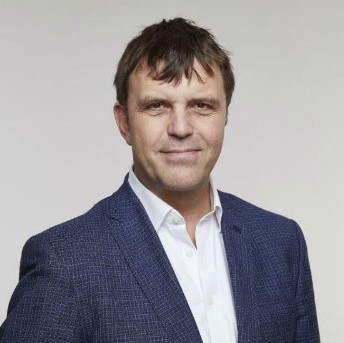
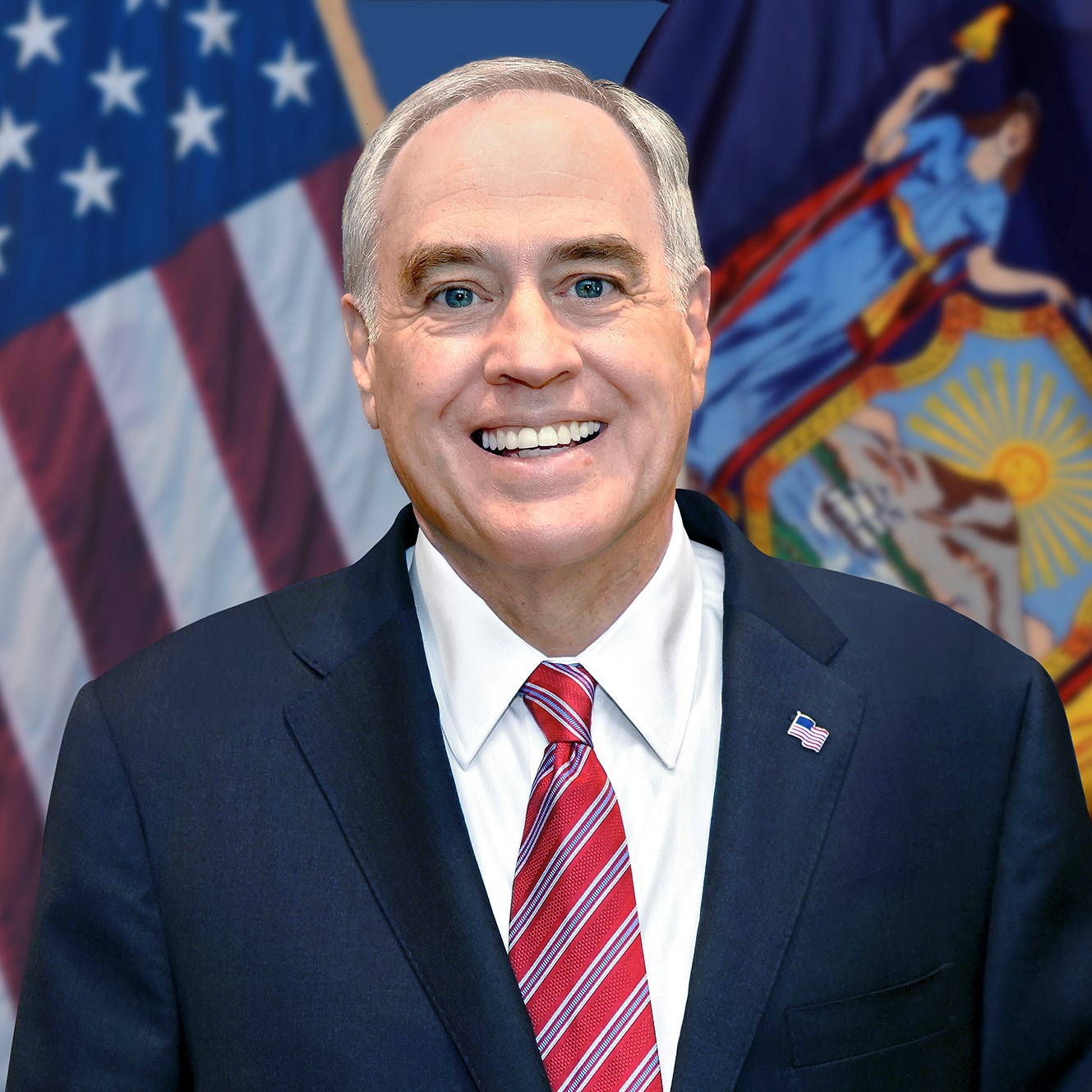
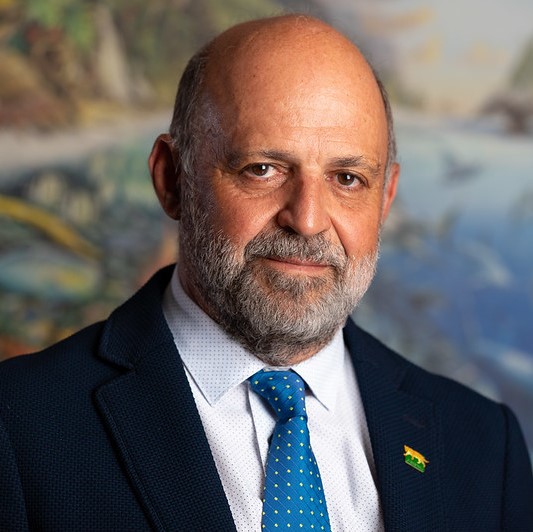
Carlos Manuel Rodriguez
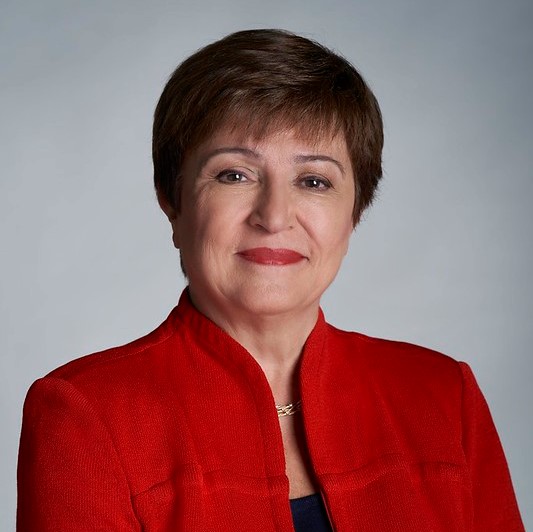

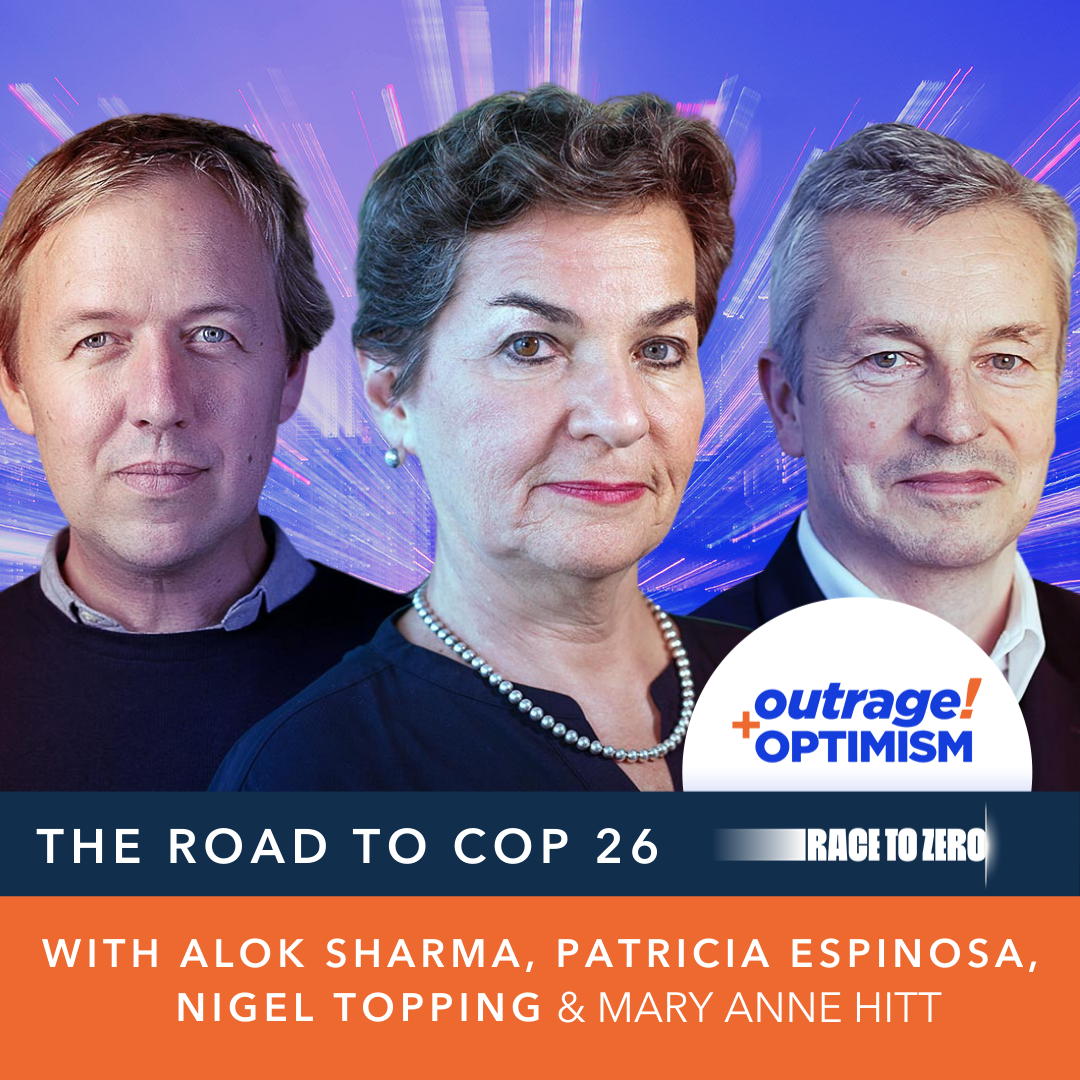

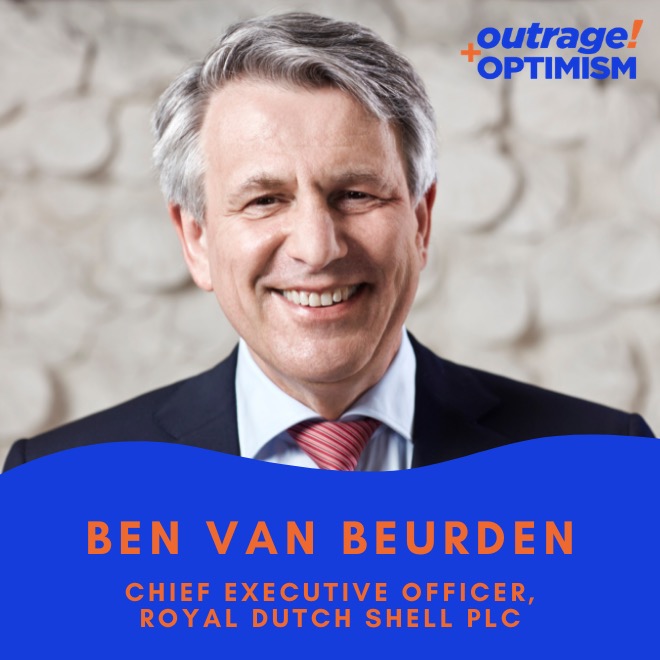
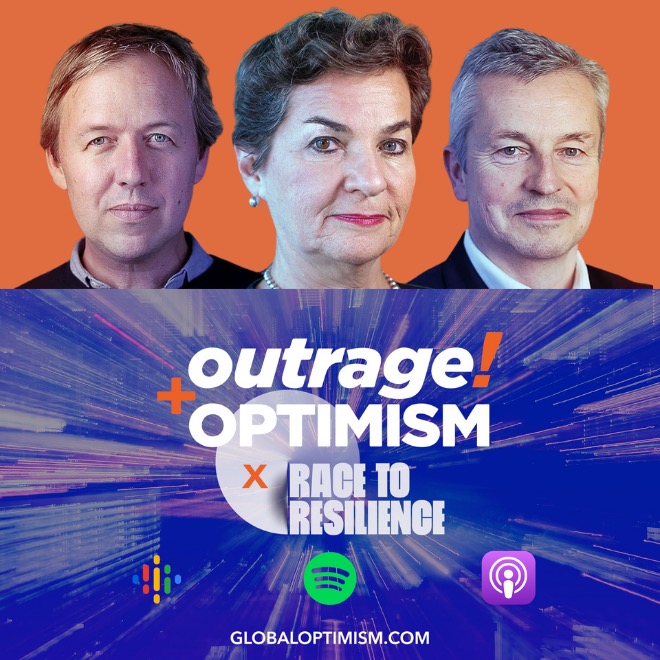
%20web%20optimised.jpg)
.jpg)
